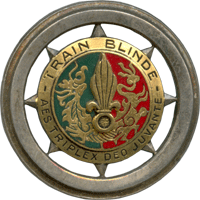Organization:Armored Train of the Foreign Legion
| Armored Train of the Foreign Legion Train blindé de la Légion étrangère | |
|---|---|
 | |
| Active | 1948 - 1954 |
| Country | |
| Allegiance | |
| Branch | |
| Size | 100 |
| 7 Flames Grenade & Golden Eastern Dragon & Rail | Train Blindé(fr) Armored Train Aes Triplex Deo Juvante (La) Triple airain, Dieu aidant(fr) Triple Alloy, God Aiding |
| Engagements | First Indochina War |
The Armored Train of the Foreign Legion (French: Train blindé de la Légion étrangère) was an Armoured train (French: trains blindés) detachment of the French Foreign Legion formed in Tonkin. In 1948, the 2nd Foreign Regiment 2e RE, formed one, then two armored trains to protect convoys from attack ambushes by the Vietminh, protect the Transindochinois Line (French: Line du Transindochinois) and roll support the Army along its chartered course. During this époque, the Legion formed several armored trains, which were mounted by the 1st Foreign Cavalry Regiment 1er REC and other Legion units.
The armored legion Train
The protection of artwork (French: Ouvrages d'art) and escort supply trains (French: l'escorte des trains de ravitaillement) subjected to ambushes, required the creation of armored trains.
The armored Legion train of Nha-Trang (La Rafale)[1] was armed by a regimental company of the 2nd Foreign Regiment 2e RE as of 1948. The train was composed of armored wagons, protected by imbedded metallic plates. The rooftops of the wagons were mounted by mobile turrets armed with heavy machine guns. The walls were reinforced by bricks and cement; with loopholes (French: meurtrières) allowing the men to repel enemy attacks. Two wagons were combat engineer specialized oriented, with no armor, they were in charge of transporting all the necessary material (including train rails) to parry a sabotage and/or reconstruct the railway when needed.
The armored train of the Legion assured the protection of all the railway networks in South-Annam, the protection of civilian and military convoys as well the transport of operational units. In July 1954, La Rafale was assigned to the Vietnamese Army.
Convoy composition
- 2 Locomatives;
- 1 Command Wagon;
- 8 Combat Wagons;
- 1 Armored Infirmary Wagon;
- 2 combat engineer Wagons, one at the front and one at the end of the Wagon convoy, for quick fixes when needed;
- 2 Pilot Wagons, at the head of the Wagon convoy, charged with detonating eventual mines.
The autonomy of the Armored Legion Train was 72 hours and the armament ( 8 twinned machine guns, one mounted 40 mm cannon, one mounted 20 mm cannon, grenade launchers, and two 60 and 81 mm mortars) allowed this rail fortress to sustain a siege when needed. The crew was constituted of a hundred men.
The Armored Legion Train accordingly resisted all ambushes, halted all sabotages and was the enduring Rolling Symbol during the chartered course duration of French Indochina.
Train insignia
Silver circled steel bandage railway; at the center on a green and red background is detached a Eastern Dragon and a golden grenade with 7 flames, encircled by a golden border with inscription: TRAIN BLINDE - AES TRIPLEX DEO JUVANTE, in both French and Latin. The steel railway indicated the vocation of the unit; the grenade with 7 flames and green and red colors are the symbols of the Legion; the insignia : "Triple Alloy, God is helping", actually means "Showing Great Courage, God is helping", is referring to the armoring of the train. The insignia was created in 1948.
See also
- Major (France)
- Jacques Servranckx
- Tonkin (French protectorate)
- French Foreign Legion Music Band (MLE)
- 5th Heavy Weight Transport Company
- Passage Company of the Foreign Legion (CPLE)
- Disciplinary Company of the Foreign Regiments in the Far East
- 5th Foreign Infantry Regiment
- Saharan Companies of the French Foreign Legion
References
- ↑ In the French language, "Rafale" has numerous meanings and designations. In Meteorology, a "Rafale" (French: une Rafale) is a sudden temporary augmentation of the wind. If the wind is violent, it is referred to as "Bourasque". In a similar context and category, a "Rafale front" (French: Front de Rafale) designates a line series of organized violent winds coming out of a thunderstorm. Similarly, a "descending Rafale" (French: Rafale descendante) is an aerial current which descends intensely under thunderstorm, and whose surface crush produces violent, divergent and turbulent winds. In the Military context, the "Rafale" (French: la Rafale) is a sudden short, violent and rapid burst of fire, shot from one Firearm with automatic fire.
Sources
- Alexis Neviaski, L’audace du rail : Les Trains Blindés du Sud-Annam ( The Rail Audacity: The Armored Trains of South-Annam), Revue historique des armées, no 234, 2004
- Source Le Grand Livre des Insignes de la Légion Etrangère de Tybor SZECSKO. Ramuncho.

